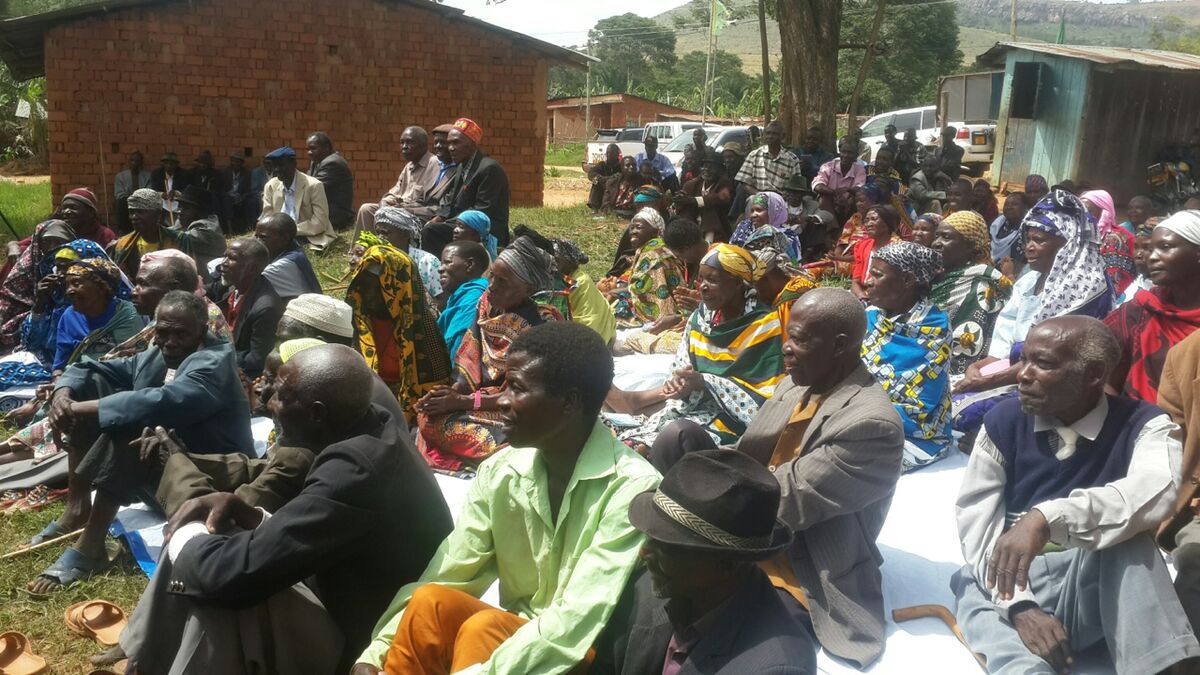- Austausch & Vernetzung
- Wissen & Lernen
- Advocacy
- Unsere Themen
Von Stefan Hofmann
"Without our pension we would be dead for a long time", could often be heard in the first years of the Kwa Wazee Pension Programme and in many cases it didn't seem to be exaggerated: At the beginning of the new millenium it became increasingly visible how severely the HIV/AIDS crisis had affected the entire family system – including the oldest. The vital role of grandparents as carers for orphaned and vulnerable children initiated the focus on older people in general and exposed their particular vulnerabilities. It was revealed how little was known about the ways of living of older people, about their achievements and their potentials. The programmes to support them turned into a permanent journey of discoveries.

This article is also available in a german version
Kwa Wazee ('for older people') was founded in 2003 with the objective to support vulnerable older people and older carers with regular payments of cash. The approach was uncommon and unpopular at the time, the amount was small – 4US$ at the start –, the number of beneficiaries was low, but the positive impact was so distinctive and immediate that the programme was gradually scaled up in the following years. The majority of participants were women – half of them main carers for grandchildren.
A study from 2008 on the impact of pensions (Salt, soap and shoes for school, pdf) confirmed the first impressions. In the quantitative part it revealed that older people supported by a pension fared significantly better than a control group in most areas which were investigated, in particular: quantity and variety of the nutrition, provision with basic products, resilience against crises, psychological wellbeing.
In the qualitative part of the study older people were asked about the biggest changes since they received a pension. Most frequently could be heard that they were now able to buy salt and soap. The two items turned out to have a metaphoric meaning. Salt not only stood for more food security and for tastier food but also for being back in the social process of giving and receiving: Salt is something you share with your neighbours if they have run out of it. – Soap on the other hand didn't only mean better hygiene and cleanliness, but also improved social inclusion, more self esteem and self confidence.

Despite improved nutrition, improved hygiene and a better psychological wellbeing, a clear improvement of the health as an impact of the pension could not be observed. Although older people who received a pension described themselves as healthier, two thirds of them also declared themselves as often sick or most of the time sick - not much different from those who did not get a pension. Expenses for health remained low.
Access to health facilities was particularly critical: Despite a national policy of exemption of costs for older people, none of all interviewed persons stated during the study of 2008 to have received free treatment. However there were plenty of examples, where services had been refused. You could often hear fatalistic statements like: "If I get sick, the only thing I can do is to go to bed and to hope, it stops somehow."
As a consequence of these lessons learned Kwa Wazee started to develop a low cost health programme based on the following elements:

Because funds were very limited from the beginning, Kwa Wazee was forced to make a selection of beneficiaries. With proxy criteria and the recommendation of village committees or older people's groups Kwa Wazee tried to identifie those older people who needed it most. However it was one of the lessons learned that in an environment where the biggest part of the population suffers from poverty a selection can never be sufficiently fair. In addition to this every selection also means marginalization and positions a minimal social protection of older people as a priviledge instead of a right. It's encouraging to see that in the national debate about the introduction of social pensions, a universal approach is clearly favoured.
This November Kwa Wazee has started a pilot programme in two villages, where all older people from the age of 70 years receive a pension. The pilot, which is planned in coordination with District Authorites aims to provide evidence and lessons learned on all sorts of practical aspects which are related to a universal approach of pension payments. A particular interest lays in village committees – elected by the older people themselves – who will implement the programme. The pilot will be monitored by a baseline survey with all older beneficiaries of the programme. This will also allow to deepen the knowledge on older people in various areas where very little is known so far.
KWA WAZEE
Kwa Wazee was initiated in 2003 and built up in the following years by Dr Kurt Madoerin, a renowned development expert who also co-founded the Regional Psycho Social Support Initiative (REPSSI). The registered Tanzanian NGO Kwa Wazee is run by an experienced local team. Kwa Wazee Switzerland has assisted the programme since the beginning with funding and support in research and programme work. 2016 around 1'100 older people are recipients of a pension by Kwa Wazee. Those among them who are main carers for grandchildren receive child benefits on top of their pension. The cash transfers are complemented by programmes to strengthen the self help activities, the health and the security and the rights of older people. Additional programmes focus on the support and the strengthening of children and adolescents.
Summary of the study: Salt, soap and shoes for school (2008): http://www.kwawazee.ch/application/files/5314/4302/8866/kwa_wazee_evaluation_report.pdf